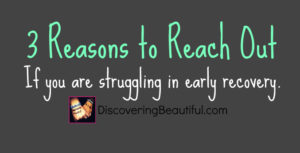
As I scroll through any one of my several news-feeds, I am reminded of my own struggles that I faced in early recovery. I can literally feel the frustration and anger from people who are withdrawing & detoxing their bodies and minds. These people are doing their very best to sort out feelings that they are now in a position to actually feel. They are navigating new territory and they aren’t afraid to speak up, mostly about how much it sucks.
Anger, sadness and feelings of loneliness, are what I see most.
Here are a few reasons why you have reach out in early recovery and why it is so important to UTILIZE the information & the help that you are offered:
1.) Your thought processes aren’t on point.
(Doesn’t mean that can’t be or won’t ever be.)
But in early recovery, you completely believe that your feelings are accurate, but please listen.
Your feelings are important. They are valid.
They are relevant and yes, they are real.
But none of this means your thoughts are accurate, realistic, or indicative of truth.
You need to have at least one person who you let into your recovery who is not afraid to (lovingly) challenge faulty thought patterns with you, and who will walk beside you to do it.
2.) Chances are, you suck at coping.
(Doesn’t mean you always will, or that you are’t capable of developing coping skills.)
Despite having met so many amazing people who are new to recovery, I have never met anyone who is struggling to stay sober, who also happens to have a set of strong, healthy coping skills to rely on.
Before you developed a dependence, chances are, that for one valid reason or another, you actually never really developed healthy ways to cope.
Living a fog free life after the black cloud lifts means that you have a clear picture of your world.
You can see things with more accuracy and you feel things more intensely.
Because of this influx of overwhelming reality, things are now flooding your new state of consciousness.
You have to cope in some way to handle all of this.
Everything that you face in early sobriety is going to require coping skills that you haven’t had time to develop.
So you have to be open to learning new things and trying new techniques in order to cope with this very fresh, and raw way of being.
Ask questions.
Ask the questions that sound ridiculous in your mind, ask hard questions, ask questions you’ve already asked just to be sure.
Learn things. Read things. Watch things. Participate in things. Expose yourself to different things.
Try out new techniques, and find things that work best for you.
Another reason to have at least ONE person who will answer their phone, reply quickly to an email, who will drive you to a meeting, or who will meet with you for coffee.
3.) Isolation can kill you.
(Doesn’t mean that it will, but it can.)
Sadly, for so many (way too many) isolation is a death sentence.
You cannot choose sobriety and resist offered varieties of support simultaneously.
Because being alone with your unhinged emotions and also having an inability to distinguish truth from the lies that your addiction relentlessly feeds on-
will quickly lead to digression and you resorting to old ways of thinking and old ways of coping.
Somewhere along the line you as you got more comfortable being all alone, you also began to believe that you couldn’t change, and you weren’t worth saving.
Addiction feeds off of these lies.
These lies about your past, your abilities, your worth, all of it. Your drug of choice needs you to be alone. It needs you to continue believing that you cannot live a sober life. It needs you to live in isolation.
The only real way to effectively combat it its strength is to abstain from it, and to keep feeding your brain with TRUTH. This truth comes from letting people in. This could be in the form of your news feed, your inbox, your bookshelf, your prayer (alone, meditation) time, or your face time at meetings, yoga, the gym, counseling, or other things.
Having people, or at least one, solid, reliable, loving person around might drive you crazy, but it can also save your life.
Please reach out and keep reaching out.
Your corner is not empty.
There really are people out there who care, and people who understand where you are.